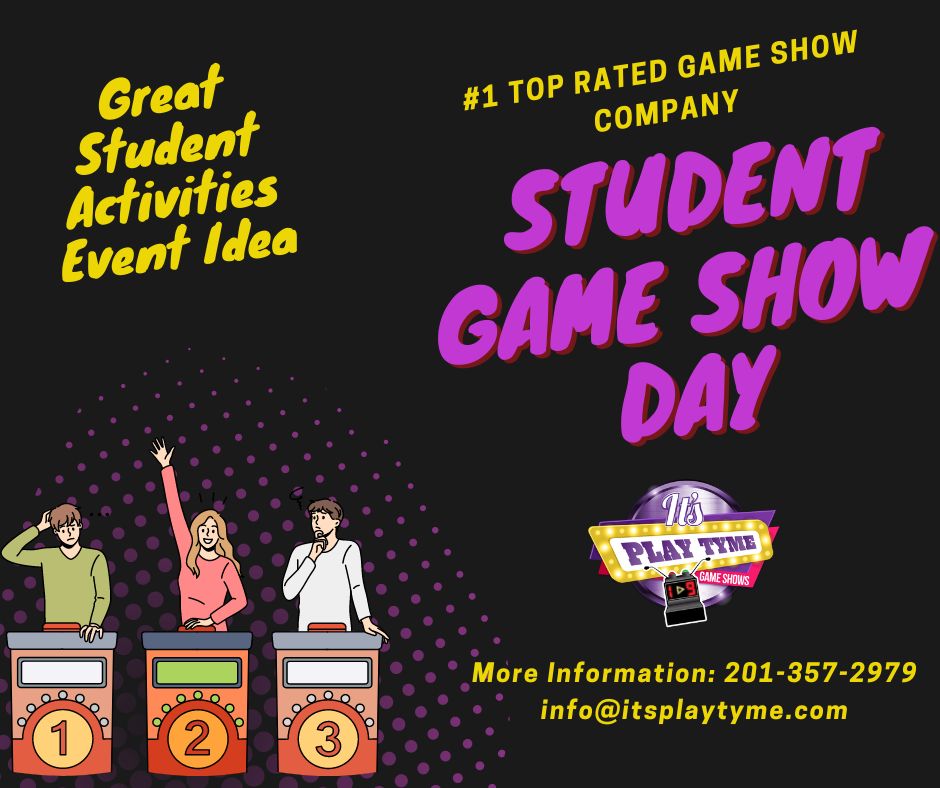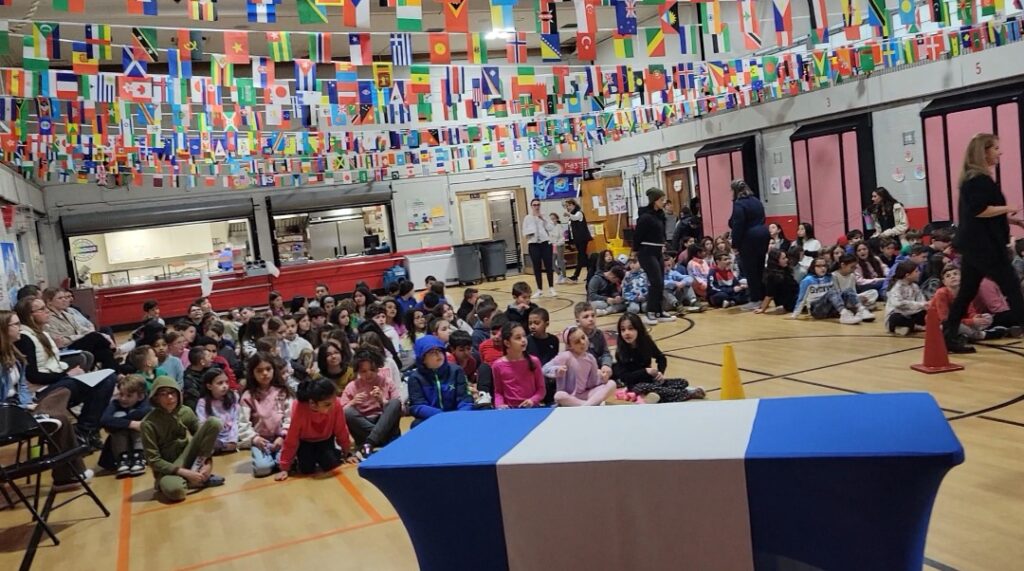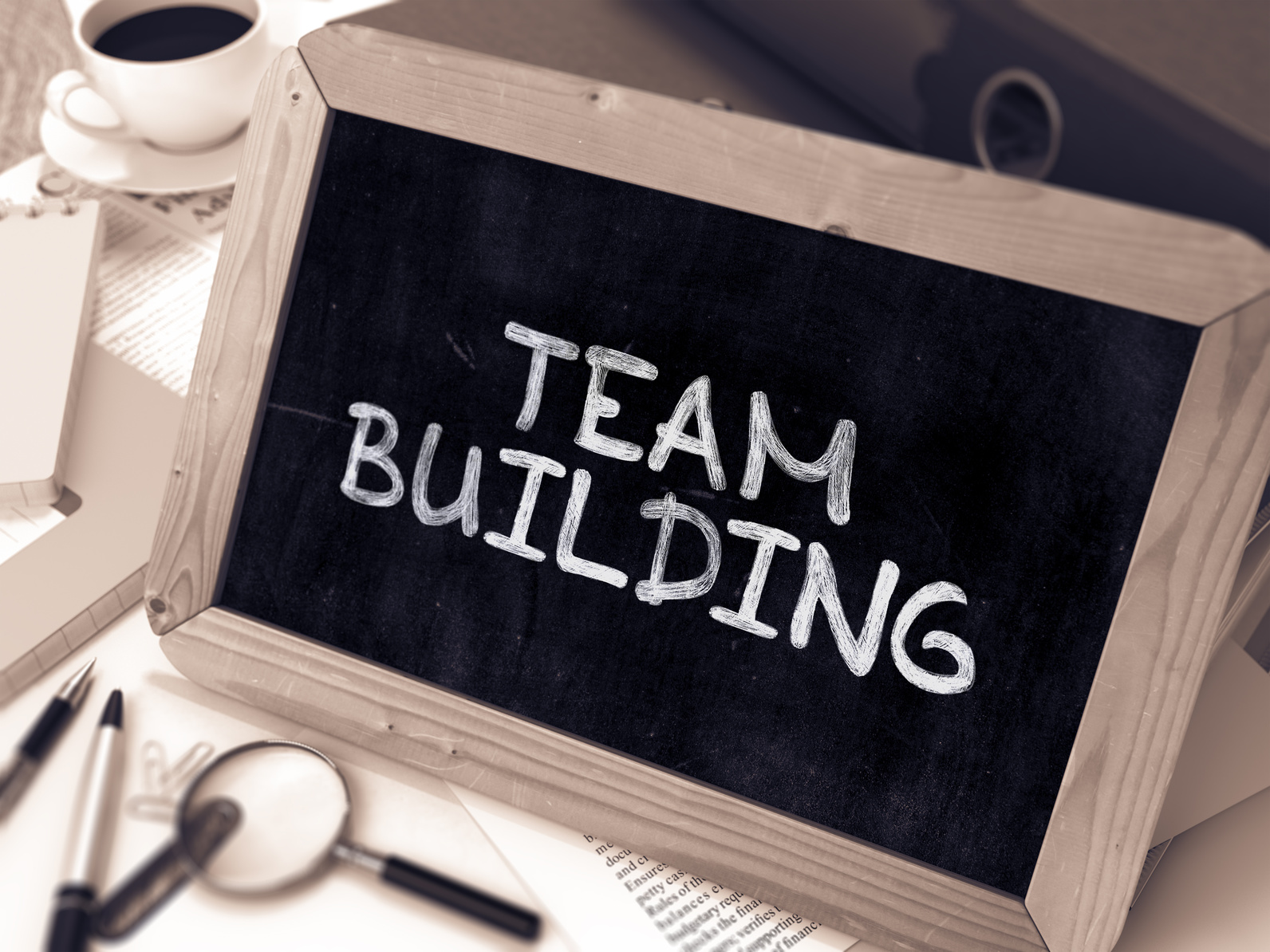The best team-building activities for school assemblies in NJ are structured experiences designed to engage large groups of students at the same time while reinforcing communication, collaboration, and school culture.
The most effective assemblies prioritize participation over presentation, using formats that work in gyms and auditoriums without creating behavior issues, downtime, or disengagement. Organizing school assemblies can be challenging, but incorporating team-building activities enhances student engagement and impact.
In New Jersey, these activities go beyond just fun; they help students build important skills like communication, problem-solving, and leadership. Students not only enjoy themselves but also strengthen their connections and develop skills they’ll use in the future.

Key Insights & Takeaways: School Assembly Team Building in NJ
If you’re short on time, here’s what matters most for school leaders planning assemblies:
- Assemblies must be built for large groups, not classroom-sized activities.
- Activities need a clear structure and pacing to maintain control in gyms and auditoriums.
- Game-based formats outperform lectures because students engage faster and stay focused longer.
- The best assemblies support school culture goals like respect, leadership, and collaboration.
- Turnkey programs reduce stress for administrators and staff supervising large groups.
- Team-building activities create a positive and inclusive environment for students during school assemblies.
- Team building helps develop valuable skills, such as communication, problem-solving, and leadership, among students.
- Effective team building results in improved student relationships and school spirit.
Game Show–Style Team Building Activities for School Assemblies
Game show–style activities consistently rank among the best team-building activities for school assemblies in NJ because they are built for large groups and high energy. Unlike traditional games that rely on volunteers or small breakout groups, game show formats allow hundreds of students to participate simultaneously. These activities combine friendly competition, teamwork, and fast-paced interaction, keeping attention high from start to finish. Most importantly, they make participation feel safe and exciting rather than intimidating.
Popular game show formats for school assemblies include:
Trivia Team Battles
Fast-paced trivia matches push students to combine their knowledge and work together under pressure. The format mirrors a high-energy Jeopardy-style showdown and keeps the entire room engaged.
👉 Explore the trivia format here.
Survey-Style Guessing Rounds
Inspired by survey-driven TV shows, teams race to guess the most popular answers to school-themed questions. It’s hilarious, interactive, and perfect for breaking the ice across grade levels.
👉 View the survey-style game here.
Word & Puzzle Challenges
Puzzle boards, letter reveals, and fill-in-the-blank rounds encourage teamwork and critical thinking. Students huddle up, debate answers, and celebrate big wins as a group.
👉 See the word-puzzle format here.
60-Second Team Challenges
Beat-the-clock games bring high energy and high cooperation. Students rely on quick thinking, trust, and communication—making it ideal for strengthening classroom and schoolwide connections.
👉 Check out the 60-second challenge here.
Interactive Audience Gameplay
With buzzer systems or keypad-style participation, every student can play—even in a large gym or auditorium. This all-in format breaks up cliques and elevates school spirit instantly.
👉 Explore interactive formats here.
These game-show experiences turn ordinary assemblies into memorable, high-energy events, helping students bond, build confidence, and enjoy a shared moment of fun, unity, and connection.
These games are perfect for schools looking to strengthen community through engaging, meaningful experiences.
While game shows create instant energy, many schools still seek additional options that strike a balance between interaction and simplicity, especially for younger students.
Book a Live Game Show!
[We bring the full game show setup to your location in NJ, NYC, or CT and run the show start-to-finish]
Why Team Building Matters in New Jersey School Assemblies
School assemblies are one of the few moments when an entire student body is in the same space at the same time. That opportunity comes with pressure. Administrators and educators are expected to deliver an experience that is meaningful, inclusive, and age-appropriate—without losing control of the room. In New Jersey schools, especially, assemblies are often tied to culture-building, behavior reinforcement, or community values. When team building is built into the assembly, students don’t just listen; they actively participate, making the message stick far beyond the event itself.
When done correctly, team building during assemblies:
- Encourages positive peer interaction
- Reduces social barriers between grade levels
- Builds confidence and communication skills
- Strengthens overall school spirit
Understanding why team building matters is the first step, but choosing the right type of activity is what determines whether an assembly succeeds or fails.
Find the Perfect Game Show for Your Team
Pick the Ideal Match for Your Team’s Unique Goals and Needs – Click Below
Other Interactive Team Building Activities for NJ School Assemblies
Not every assembly needs to be fast-paced from start to finish. Some of the best team-building activities for school assemblies in NJ include low-pressure interactive games that encourage cooperation and creativity. These activities are especially effective when schools want to reinforce social skills, empathy, or classroom collaboration. The key is choosing activities that scale well and don’t single out individual students in uncomfortable ways.
Effective interactive activities include:
- Human Knot, which emphasizes communication and teamwork
- Pass the Picture, a creativity-based group exercise
- Two Truths and a Lie, which helps students learn about one another
| Activity | Purpose |
|---|---|
| Human Knot | Builds trust and problem-solving |
| Pass the Picture | Encourages creativity and collaboration |
| Two Truths and a Lie | Strengthens peer connections |
Once students are comfortable interacting, schools can introduce deeper collaboration exercises that reinforce teamwork on a larger scale.

Group Collaboration Games That Strengthen School Culture
Group collaboration games are ideal for assemblies focused on unity, behavior expectations, or leadership development. These activities require students to work toward a shared goal, reinforcing the idea that success comes from cooperation rather than individual performance. For NJ schools managing diverse student populations, collaboration games help break down cliques and encourage inclusive participation.
Examples include:
| Game | Outcome |
|---|---|
| Group Juggle | Improves communication and focus |
| Marshmallow Challenge | Builds problem-solving and creativity |
| Human Knot | Reinforces teamwork under pressure |
With collaboration established, assemblies can become powerful platforms for developing student leadership skills.
Book a Live Game Show!
[We bring the full game show setup to your location in NJ, NYC, or CT and run the show start-to-finish]
Quick 5-Minute Team Building Exercises for Students
Student collaboration and teamwork are essential for school success. By incorporating team-building exercises into school assemblies in NJ, students can learn vital skills that will serve them well in their future academic and professional lives.
Adding team-building exercises is an effective way to develop these skills while fostering a positive school community.
Here are some team-building exercises that I recommend:
1. Blindfolded Obstacle Course: In pairs, one student is blindfolded while their partner offers verbal guidance to navigate an obstacle course. This exercise teaches trust, communication, and active listening.
2. Minefield: Place objects on the ground and divide students into pairs. One student is blindfolded, and the other student guides them through the minefield without touching any objects. This exercise promotes trust, leadership, and communication.
3. Human Knot: Students stand in a circle and hold hands with two different people not next to them. They then untangle themselves, forming a circle without releasing their hands. This exercise improves problem-solving, communication, and cooperation.
4. Paper Tower: Small groups of students are given a limited amount of materials to construct a tower out of paper, tape, and scissors. This exercise fosters creativity, communication, and teamwork.
5. Egg Drop: Students work in teams to construct a container that can protect a raw egg from breaking when dropped from a certain height. This exercise develops creativity, problem-solving skills, and teamwork.
These particular exercises promote effective communication, problem-solving, and leadership skills, while also fostering a sense of community within the school.
Leadership-Focused Team Building Activities for Students
Leadership development is a major priority in many New Jersey schools, and assemblies provide a unique setting to reinforce these skills. Team building activities that emphasize decision-making, accountability, and communication help students see leadership as action—not position. When leadership exercises are interactive, students are more likely to internalize the lesson rather than tune it out.
Leadership-focused activities help students:
- Practice decision-making in real time
- Communicate clearly under pressure
- Support teammates toward a shared outcome
Before diving deeper into leadership development, many schools start with icebreakers to create comfort and trust across the room.
Icebreaker Games for School Assemblies
Icebreakers play a critical role in setting the tone for school assemblies. They reduce tension, ease social anxiety, and prepare students to engage more fully in team-building activities. Unlike deeper team exercises, icebreakers are short, simple, and designed to get students comfortable participating without fear of embarrassment.
| Icebreaker | Benefit |
|---|---|
| Human Bingo | Encourages movement and interaction |
| Name Game | Builds familiarity |
| Group Juggle | Boosts focus and teamwork |
Once students are comfortable participating, cooperative learning activities can reinforce both academic and social skills simultaneously.
3 Cooperative Learning Activities
Cooperative learning activities are an excellent way to enhance the learning experience and promote teamwork among students.
By working together on a common task, students learn to communicate effectively, listen to each other’s perspectives, and support one another.
Here are some examples of cooperative learning activities that can be incorporated into school assemblies:
1 – Peer Teaching
In this activity, students are divided into pairs, and each pair is assigned a specific topic related to the subject matter being discussed. Each student then prepares a short presentation on their topic and delivers it to their partner. After the presentations, students switch roles and share their knowledge on the other topic. This activity allows students to take ownership of their learning and engage in meaningful discussions with their peers.
2 – Jigsaw Technique
The jigsaw technique involves dividing students into small groups and assigning each group a different piece of information related to a larger topic. Each group becomes an expert on their piece of information before sharing it with the rest of the class. This activity fosters collaboration and encourages students to take responsibility for their own learning while also learning from their classmates.
3 – Think-Pair-Share
In this activity, students are asked to think individually about a question or problem related to the subject matter. They then pair up with a classmate and share their thoughts, discussing possible solutions or approaches. Finally, pairs present their ideas to the larger group. This activity promotes active listening, critical thinking, and problem-solving skills, and allows students to learn from each other’s insights.
These cooperative learning activities are just a few examples of how team building can be incorporated into school assemblies to enhance the learning experience and promote collaboration and teamwork among students.
If you are planning an upcoming school assembly and are looking for fun, interactive, and educational activities, click here.
Team Workshops in NJ Schools
Team building workshops take assembly engagement a step further by combining structured learning with interactive participation. These workshops are an effective way to improve collaboration, communication, and problem-solving skills. Conducting these workshops during school assemblies can help encourage students to work together more effectively as a team. Workshops for schools should be designed to engage all participants while fostering a positive and supportive environment.
The benefits of organizing team building workshops for schools include:
- Improved group dynamics and communication
- Increased trust and respect among team members
- Enhanced problem-solving and decision-making skills
- Inspires creativity and innovation
To see how these approaches work in real schools, it helps to look at actual outcomes.
There is a range of workshops that can be tailored to suit the needs of different schools. Some examples include:
| Workshop Name | Description |
|---|---|
1 – Scavenger Hunt |
A fun and interactive team-building activity that encourages communication, problem-solving, and teamwork. Students work in groups to complete a series of tasks and challenges. |
2 – Escape Room |
Similar to a scavenger hunt, students work collaboratively to solve puzzles and clues to escape a locked room within a specified timeframe. |
3 – Cooking Challenge |
An activity that encourages students to work together to prepare a meal. This workshop emphasizes the importance of communication, delegation, and leadership among team members. |
4 – Survivor Challenge |
A team-building workshop that requires students to work in teams to complete physical and mental challenges. This workshop promotes leadership skills, decision-making, and problem-solving abilities. |
Team building workshops for schools are an ideal way to help students develop their leadership skills, communication abilities, and teamwork skills.
Integrating these activities into school assemblies provides an excellent opportunity for students to enhance their personal and professional growth.


Activities for Schools NJ
Case Study 2: Elementary School Assembly Focused on Culture & Values
The Challenge:
An elementary school in New Jersey wanted an assembly that reinforced themes of kindness, respect, and cooperation without lecturing students or losing their attention. The concern was keeping younger students engaged while maintaining structure and safety.
The Approach:
Cooperative team challenges were introduced that required students to work together toward shared goals. Activities were designed to be inclusive, age-appropriate, and easy for staff to supervise in a large group setting.
The Outcome:
- Strong peer collaboration during the assembly
- Increased student confidence in group participation
- Teachers observed improved classroom interaction in the days that followed
Why This Matters for Decision-Makers:
These assemblies succeeded because they were designed for scale, structure, and outcomes—not just fun. When participation is intentional and facilitation is professional, assemblies become tools for culture-building instead of one-off events.
Final Word: Who These Activities Are For
The best team-building activities for school assemblies in NJ are designed for principals, superintendents, pto presidents, and school administrators who are responsible for delivering assemblies that actually work, not just on paper, but in real gyms and auditoriums filled with students. These activities are ideal for schools that need high participation without chaos, clear structure without rigidity, and engagement without putting individual students on the spot.
This approach works best for schools that care about student behavior, school culture, and meaningful interaction, not just filling time on an assembly schedule.
It’s especially effective for administrators who want assemblies to reinforce values like respect, collaboration, leadership, and inclusion while still keeping students energized and focused.
If your goal is to create assemblies that students remember for the right reasons and that teachers support because they see the impact afterward, these activities deliver that balance.
Book a Live Game Show!
[We bring the full game show setup to your location in NJ, NYC, or CT and run the show start-to-finish]
FAQ – Best Team Building Activities for School Assemblies in NJ
What are the best team building activities for school assemblies in NJ?
The best team building activities for school assemblies in NJ are structured, large-group experiences that keep students participating at the same time. The most reliable options include game show–style trivia, survey-style team rounds, word and puzzle challenges, and timed team competitions because they work in gyms and auditoriums without long downtime. Schools typically choose formats that reinforce collaboration, communication, and school culture while staying easy for staff to supervise.
How do you keep students engaged during a school assembly?
Student engagement stays high when assemblies are designed for simultaneous participation, clear rules, and fast pacing. Activities should avoid long volunteer segments where most students watch instead of play. Team-based formats work best because they create shared focus, reduce side conversations, and give students a clear role within their group.
What team building activities work best for large groups in a gym or auditorium?
Large groups do best with activities that involve everyone at once, such as audience-wide trivia, team competitions, structured call-and-response games, and timed challenges. The key is limiting downtime and keeping the room moving through short rounds. In New Jersey schools, game-based formats are often preferred because they deliver energy and structure without putting students on the spot individually.
Are game show–style assemblies appropriate for elementary and middle school students?
Yes, game show–style assemblies can be age-appropriate for both elementary and middle school students when the questions, rules, and pacing are tailored to the grade level. Elementary versions tend to use simpler prompts and cooperative team scoring, while middle school versions can add faster trivia rounds and more competitive challenges. The best formats keep participation inclusive and avoid singling out students in ways that create anxiety.
When is the best time of year to schedule team building assemblies?
Many New Jersey schools schedule team building assemblies at the start of the school year to set expectations and build culture quickly. They’re also effective before testing season, after winter break, during leadership weeks, and when a school wants to reset behavior and strengthen community. The best timing depends on whether your goal is onboarding, motivation, culture-building, or improving student connections.
What’s the easiest way to run team building activities without adding stress for staff?
The easiest approach is using a turnkey, structured format with clear facilitation, tight pacing, and simple supervision requirements for teachers. Schools should prioritize activities that don’t require complicated materials, multiple stations, or long setup time. If your goal is high participation with minimal staff workload, a professionally facilitated game show–style assembly is one of the most reliable options for large groups.











